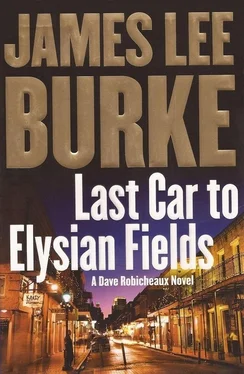Clete used a toothpick to spear a peeled shrimp from a large bowl of crushed ice on the bar, dipping it in hot sauce, inserting it in his mouth. His badge holder was stuck in his belt, mine in the breast pocket of my sports coat. But still no one looked at us.
“Give me a Jack straight up with a beer back,” he said to the bartender.
“Right away, suh,” the bartender replied.
“That’s a joke,” Clete said.
LeJeune’s friends were not people who had to contend with the world.
They may not have owned it, nor would they take any part of it through the grave, but while they were alive they could lay rental claims on a very large portion of it.
“Mr. LeJeune, we’d like for you to come with us to the Iberia Parish Sheriff’s Department,” I said.
“Why should I do that, Mr. Robicheaux?” he replied, addressing the ball on his tee, his feet spread, his thighs flexed tightly.
“We need you to answer some questions about the murder of Dr. Samuel Bernstine and the fact Will Guillot has been blackmailing you about your molestation of your daughter when she was a child,” I said.
In the silence I could hear leaves scraping across the surface of the tennis court. LeJeune seemed to gaze at an isolated thought in the center of his mind, then he sighted downrange and smacked the ball in a straight line, like a rifle shot, so that it did not strike earth again until it was almost to the oak trees smoking in the electric lights.
“You need to talk to my attorney, Mr. Robicheaux, not to me,” he said.
“Did you hear what I said? We’re investigating a homicide, the second one that happens to be connected with your name. We don’t call attorneys to make appointments,” I said.
He turned and dropped his driver in an upended leather golf bag.
He wore a silk scarf around his neck, as an aviator might, the ends tucked inside a sweater with small brown buttons on it. In the corner of my eye I saw two security guards walking from the club’s main building and a man at the bar punching in numbers on a cell phone.
LeJeune began chatting with a woman seated at a table as though I were not there. Then I started to lose it.
“You had Junior Crudup beaten to death,” I said. “You turned your daughter’s childhood into a sexual nightmare. You sell liquor to drunk drivers and probably dope and porn in New Orleans. You think you’re going to walk away from all this?”
“Mr. Robicheaux, I don’t know if you’re a vindictive man, or simply well-meaning and incompetent. The truth is probably somewhere in between. But you need to leave, sir, to let this thing go and give yourself some peace,” he replied.
His detachment and his pose as a chivalric and charitable patriarch were magnificent. As Clete had always said, some people have no handles on them. Castille LeJeune was obviously one of them, and I felt like a fool.
Then Clete, who all night had been the advocate of reason and restraint, stepped forward, his thick arm and shoulder knocking against mine. “You were a fighter pilot in the Crotch?” he said.
“In the what ?” LeJeune said.
“I was in the Corps, too. Sunny “Nam, class of ‘69, smokin’ grass and stompin’ ass with Mother Green’s Mean Machine. See?” He removed his utility cap and pointed to the globe and anchor emblem inked on the cloth. “We used to have a Bed Check Charley, but he was a guy who’d start lobbing blooker rounds in on us at about oh-two-hundred so nobody could get any sleep. Do you have any autographed photos? No shit, it’d mean a lot.”
“Sir, I don’t ask this for myself, but there’re ladies present. Let’s don’t have this kind of scene here,” LeJeune said.
“I can dig it,” Clete said, putting his cap back on, his eyes cocked up in his head as though he were meditating upon a metaphysical consideration. “The problem is some grease balls kidnapped and tortured a police officer and pissed all over his face while he was blind folded. So how about taking the corn bread out of your mouth?
It’s getting to be a real drag.”
“I apologize for any offense I may have given you,” LeJeune said. “Tell me something, that badge you have hanging from your belt? I have the feeling you’re not a police officer.”
I could see the heat climbing into Clete’s face. “Dave, hook up this prick. Work out the legal stuff later,” he said.
The situation was deteriorating rapidly now. Two security guards had just walked into the pavilion and were standing behind us, awkward, unsure what they should do next. I turned so they could see my badge.
“It’s all right. Iberia Parish Sheriff’s Department,” I said.
They tried to be polite, their eyes avoiding mine. I felt sorry for them. They made little more than minimum wage, paid for their own uniforms, and possessed no legal powers. They waited for Castille LeJeune to tell them what to do.
But I raised my finger before he could speak. “We’re leaving,” I said.
“Screw that,” Clete said.
Two cruisers from the St. Mary Parish Sheriff’s office had pulled into the parking lot and three uniformed deputies, one black, two white, were walking toward us, their faces filled with purpose. I slipped my hand around the thickness of Clete’s arm and tightened my grip. “We’re done here,” I said.
But it was too late. The three deputies went straight for Clete, with the collective instinct of pack hounds who had just gotten a sniff of a feral hog. At first he didn’t resist. When they walked him toward a cruiser, he was seemingly in control of himself again, grinning, full of fun, back in his familiar role of irreverent trickster, ready to let it all play out.
Maybe I should have stayed out of it. But I didn’t.
“Let’s slow it down a little bit,” I said to the black deputy, a towering man with lieutenant’s bars on his collar.
“Best let us do our job, Robicheaux,” he replied.
“What’s the beef?” I said.
“Impersonating a police officer,” he replied.
“That’s bogus. He never claimed to be a police officer.”
“Work it out at the jail. We just deliver the freight,” he said.
It should have all ended there, a routine roust to appease a rich man, a discussion down at the sheriff’s department, maybe a few hours in a holding cell, at worst an appearance in morning court where the charge would be kicked.
But one of the white deputies, an angry man with corded veins in his neck who had been fired in another parish for abusing a prisoner, had pushed Clete into a search position against the hood of the cruiser and was running his hands down Clete’s left leg.
“Ease up, my man,” Clete said.
“Close your mouth,” the deputy said.
“That’s a slapjack in my right hand pocket. I’m not carrying,” Clete said, twisting around.
“I told you to shut up,” the deputy said, and slapped Clete’s utility cap off his head.
Clete ripped his elbow into the deputy’s face, breaking his nose, then caught him in the jaw with a right hook that lifted him off the ground and knocked him the full length of the cruiser.
“Ouch,” he said, trying to shake the pain out of his hand, trying to step back from his own misdeed.
Then they were on him.
It rained at sunrise and kept raining through the morning. Clete was in jail and Father Jimmie had not returned to the house. Because it was Saturday Helen was at home. I called her and told her how it had gone south at Castille LeJeune’s golf and tennis club.
“What did you plan to accomplish over there?” she said.
“Not sure.”
“I am. You wanted to provoke a confrontation and blow pieces of Castille LeJeune all over the golf tee.”
Читать дальше












